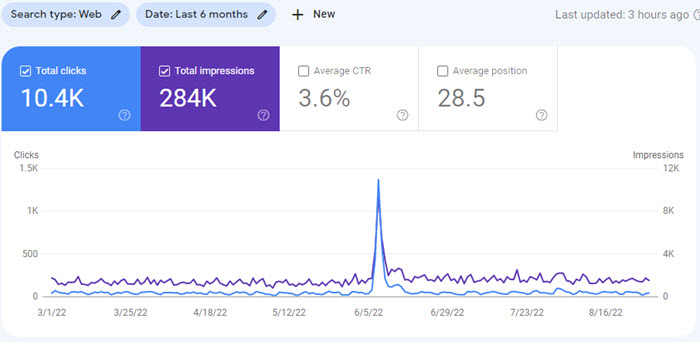
We talk about ranking factors a lot, but not much about systems. Your business’s local visibility depends on the ranking factors tilted in your favor, but you can’t get more factors tilted in your favor without systems that help you learn as you go. Otherwise, you’ll be like a magician who tries to learn a new magic trick real-time while in front of a live audience.
Whether you do your own local SEO or do it professionally for clients, you probably spend most of your time on how you measure and how you troubleshoot. Those are crucial, of course, but they’re not as useful without two other systems that most people never develop:
- Ways to collect or create internal resources that you don’t have to rely on a third party for, particularly real-life examples of this and that. I wrote about that in 2017.
- Ways to test out ideas – with a minimal likelihood of destroying your business or a client’s business. That’s what I’m talking about today.
You don’t need to be perfectly “scientific,” because usually it’s impossible to be. You just need the ability to arrive at a hunch and see what happens when you act on it. Along the way, you jot down (at least roughly) what you did and monitor it in Search Console or Analytics.

So where can you set up a little test for improving your local SEO effort? The first thing you’ll need to determine is which business or other entity you’d like to mess around with. Think of these as the possible labs in which you might set up your experiment(s):
- Your own business. I’m talking about your main or only website, your main and only GMB page, and perhaps your sole source of income. This is more likely to be practical, wise, and not terrifying if you’re a professional local SEO than if you’re the employer of 17 people. If I’m doing something with a high likelihood of disaster, I do it on my own business or personal lab chimp before I tell a client about the clinical trial.
- A “practitioner” at your business or practice. Perhaps this person is the junior attorney fresh out of law school, or the semi-retired doctor, or the real-estate agent with a gamblin’ streak, etc.
- An old or non-operational location of your business. It may still pop up in the local search results, and you may or may not care whether it does.
- An old business you own (or owned once) that’s not operational. It may or may not have a site, a GMB page, citations, or any visibility, but it’s still findable online to one degree or another.
- A “lab chimp” client or other volunteer. This person should be willing and not too sedated. Make clear up-front what you know, what you don’t know, what you’re trying to find out, what you expect to happen, what the possible upsides are, what the possible downsides are, and so on. Professor Maps’ client Barbara Oliver Jewelry is easily the best-known example of this in the local SEO space. (Several of my clients also are down with the experiments, if not all that fame.)
- The business of a friend, family member, colleague, or stranger. Someone you know may have run into a problem, and you may be in a position to suggest or to MacGyver a fix. You may be the last resort, or perhaps that business has never had any SEO work done, in which case there’s probably not much to lose. The friends or family members may already trust you and know what they’re in for. In the case of a “stranger,” like someone who posted on a forum, you should probably say something like, “This is just a hunch, and I’m not certain this will work, but have you tried such-and-such?”
- A fake businesses. Create a “business” with a totally separate website and a GMB page that’s not connected to the Google account you use for your real GMB page(s). Here’s one of my favorite examples.
- A side hustle. Maybe it’s for a hobby you used to monetize, or that you want to. Regardless of the results you’ve seen so far, the stakes are nice and low.
- A page on your site you don’t care about. It’s no big deal if the SEO move you try out doesn’t do much or tell you much. But if it does, then the next experiment may involve a page you consider a high priority, where a bump in visibility means more loot in the pirate ship.
- A test website: one you semi-retire, or build from the ground up, or acquire from someone else. With it may also come a backlinks profile (impressive or nauseating) that may give you even more ways to experiment.
- A landing page for a location that’s underperforming, if you’ve got a multi-location business.
- A GMB page for a “practitioner” at your business or practice, or for a “department” in it. Discrete practitioners or departments can have their own GMB pages, and sometimes it’s a good move to develop those pages.
- A GMB page for a location that’s underperforming. Especially if this location of your business used to do well, but has slipped, then the results of your experiment don’t need to be earth-shaking for the results to be worth your trouble, in terms of profit, visibility, or insight.
- A suspended GMB page. Either before or after your page (or access to it) is reinstated, you can make changes that you may have been worried to make before you got suspended. The worst that happens is you’re suspended for a while longer, because there’s one more issue to sort out.
- A GMB page for a business you know for a fact is closed. You can submit Google Maps edits, and if the page is not owner-verified there’s a higher-than-usual likelihood they’re approved.
- Local citations. You can lard the business name and other fields with keywords, create duplicate listings, make frequent edits (like to the categories), get reviews from questionable sources, point cheap-o paid links to the listings, and do other things you probably wouldn’t want to do to your site or GMB page, all with little or no consequence. (Except on Yelp.)
- A separate Google account and username, one you use to submit Google Maps anti-spam edits, write reviews, create experimental GMB pages, contact GMB support, etc. It’s a nom de plume.
- Rank-tracking software, like Local Falcon or Whitespark. Arguably these tools are more a way to monitor experiments you do on or off your site, or to make comparisons between you and your competitors. But I’d be remiss not to mention them because they allow you to set up tests that would be much harder to set up otherwise. Here’s a good example.
- A fictional search term. Making up a word or very distinct phrase, trying to rank for it, and seeing how much time or effort went into the process, can tell you a lot. It’s also low-risk, in that Google doesn’t know anything about your neologism, and your experiment probably won’t involve making big changes of any kind. By the way, the phrase doesn’t need to be nonsense: it could be a trademarked or other proprietary term.
- Volunteers who can take all kinds of simple actions, like making a “suggest an edit” edits on Google Maps, writing a review, posting a photo, checking out a search result, or using a specific device or browser. It doesn’t take too many of those to send your idea aloft.
What kinds of ideas or moves should you test out? I consider Darren Shaw the GOAT at setting up and documenting tests; check out his Slideshare and blog posts. Those should provide plenty of food for thought.
Beyond those ideas, here are a few examples of experiments I’ve done and blogged about over the years:
- What observable effect does one great backlink have?
- How does Google handle a Google review of one’s own business?
- How easily can I become and remain an “Elite” Yelp reviewer?
- How little effort does it take to get a “one-box” result?
- When is Google likely to remove (or not remove) GMB pages at uninhabited addresses?
- When Google rejects your corrective edits to a spammy GMB name, can you get Google to fix the name partially?
- Do reviews (on Google or Yelp) get filtered if you copy and paste them onto your site?
- How often does Google approve “suggest an edit” reports on competitors’ Maps spam when you do everything you can do?
- What happens if you use and then cancel Moz Local?
- When can you get reviews transferred from one local listing (GMB or Yelp) to another?
…plus other quick-n’-dirty experiments I’ve blogged on here and there, many more I’ve tested out but haven’t chronicled in a dedicated blog post, and more still that I haven’t even written about at all. I’m a doodler, and I highly recommend you doodle, too. The longer you do local SEO, the more questions you’ll have, but some of those questions have answers that you can Zatōichi your way toward.
—
Any other kinds of businesses or entities someone could experiment on?
What about specific “Petri dishes” within that business?
Any tests you’ve done that you care to describe, or great tests someone else did?
Leave a comment!


